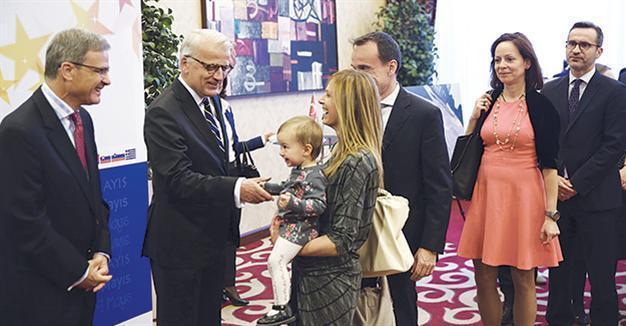EU to look into fine print of Turkey’s terror legislation
Emine Kart - ANKARA
 The European Union’s top diplomat based in Ankara said Brussels will have to see the final version of Turkey’s legislation on terrorism before making a final decision on the prospective deal to liberalize visa requirements for Turkish citizens visiting Schengen member countries.
The European Union’s top diplomat based in Ankara said Brussels will have to see the final version of Turkey’s legislation on terrorism before making a final decision on the prospective deal to liberalize visa requirements for Turkish citizens visiting Schengen member countries.Hansjörg Haber, the head of the Delegation of the European Union to Turkey, sounded a note of optimism following President Recep Tayyip Erdoğan’s latest remarks on Turkey’s commitment to resume cooperation with the EU.
“I think it was forward looking and constructive and it gives me hope,” Haber told the Hürriyet Daily News late on May 9, hosting a reception marking Europe Day, just a few hours after Erdoğan said the prospective deal to liberalize visa requirements for Turks visiting EU member countries should accelerate Turkey’s accession process and full EU membership remains Ankara’s strategic goal.
“I think we will have to look into the fine print of the roadmap of the Turkish legislation. This has come up very suddenly and we haven’t really had time yet to look at where we can meet,” Haber said when asked whether there was a way the visa liberalization deal could be concluded without making amendments needed for terrorism legislation.
The European Commission has asked member states to grant visa-free travel to Turks in return for Ankara stopping migrants from reaching Europe, but said Turkey still had to change some legislation, including bringing its terrorism laws in line with EU standards.
“The EU says, ‘you will change the anti-terror law in return for visas’ ... Pardon me, but we are going our way and you can go yours,” Erdoğan had said in a blunt message to the EU on May 6.
But in an apparent attempt to clarify Ankara’s position on the deal, Erdoğan stated in his message for Europe Day that full EU membership remains Ankara’s strategic goal, while also vowing Ankara’s commitment to resume cooperation with the 28-member bloc, including efforts to cope with migration crisis stemming from Syria, Iraq and other conflict zones.
Deputy Prime Minister Mehmet Şimşek attended the reception hosted by Haber, after marking Europe Day with a message posted to his official Twitter account earlier on the same day.
“Happy #EuropeDay2016. Thank you EU for being the engine of change for a more peaceful, democratic, stable, & prosperous world,” Şimşek said.
“It was very loud and clear,” Deputy Prime Minister Şimşek told the Hürriyet Daily News while commenting on his message.
High-Level Political Dialogue meeting postponed
On May 10, it became clear that a High-Level Political Dialogue (HLPD) meeting between Turkey and the EU, originally scheduled to take place in Brussels on May 13, had been postponed.
“The EU and the Turkish side agreed together to reschedule the HLPD to a later date in the coming weeks,” an EU official said on May 10, without elaborating on the reason for postponement.
A senior Turkish diplomat confirmed that the meeting was postponed.
“It is not yet clear when it will be held,” the senior diplomat added, speaking under condition of anonymity.
The High Representative for Foreign Affairs/Vice-President of the European Commission Federica Mogherini, Commissioner for European Neighborhood Policy and Enlargement Negotiations Johannes Hahn, Turkish Foreign Minister Mevlüt Çavuşoğlu and Turkey’s EU Minister Volkan Bozkır, were supposed to attend the HLDP. Bozkır already departed on May 10 for official talks in Strasbourg and Brussels.
On May 11, in Strasbourg, Bozkır will hold a bilateral meeting with Mogherini, EU officials said. A meeting with Hahn when he proceeds to Brussels was already on Bozkır’s official schedule posted on May 10.
The Hürriyet Daily News has learned that Çavuşoğlu is scheduled to be in Turkey this week, but diplomatic sources were not able to elaborate on his schedule for May 13.
The HLPD meetings are part of regular bilateral meetings between the European Union and Turkey, taking place on a ministerial level twice a year since July 2010.
















